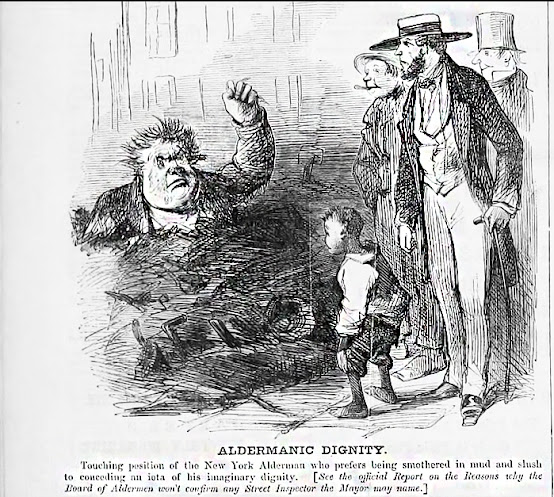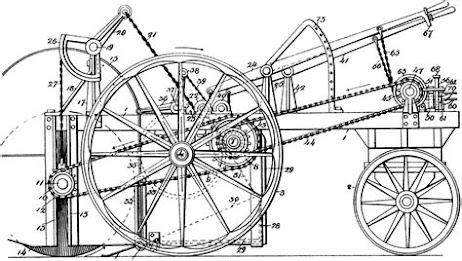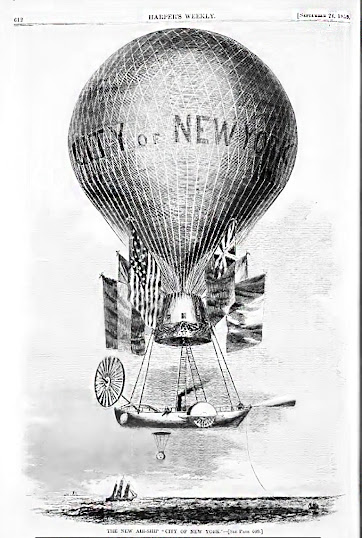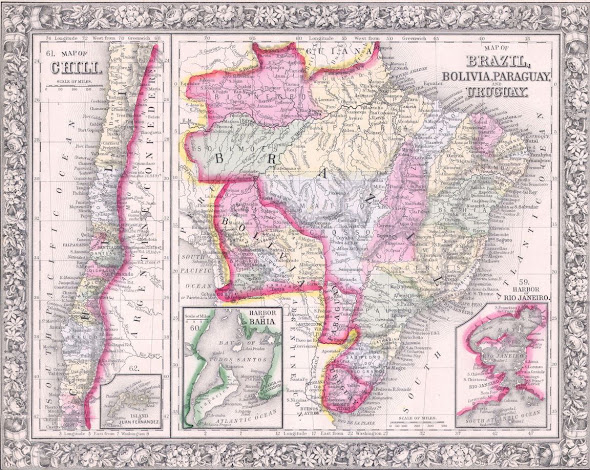Keep the Dust Down--Street Sweepers & Alderman Mud
Street Sweepers & Alderman Mud
Harper's Magazine
Touching position of the New York Alderman who prefers being smothered in mud and slush to conceding an iota of his imaginary dignity. (See the official Report on the Reasons why the Board of Aldermen won't confirm any Street Inspector the Mayor may name.)
Keeping streets clean, particularly in large cities has always been a challenge. In a pre-mechanical world when nearly every conveyance depended on horse power, horse shit was more than just a political problem.
Moreover, cows and pigs were kept in the city
before zoning laws. Feral cats and dogs roamed the streets. Dead animals and
animal waste added to whatever humans contributed throwing out food scraps and emptying
chamber pots.
Crossing a street after a rain storm was particularly problematic
as dirt and dung created slime. Hoping
for a penny tip, children at street corners armed with crude brooms of tree branches
and straw would jump in front of prosperous looking men and women, to sweep a
clear path for them. Most times their services were unnoticed and unpaid. A campaign started to change that.
Volunteer Street Sweepers
The Journal of Commerce recommends that the Police Department should arrest all the little barefooted boys and girls who earn a few pennies by sweeping a passage through the mud at the street crossings. The argument of the Journal is that these industrious little mud-larks learn to be beggars by the encouragement they receive in their voluntary labor. But such hard and useful labor as they perform, we should say, would have anything but such an effect as our contemporary anticipates. Beggars are not made by such hard work. If it were not for the services rendered by these little creatures with their stump brooms, the streets would be altogether impassable, and instead of arresting them, the Commissioner of Streets and Lamps should be compelled to compensate them out of his own pocket for performing the duty which he neglects to fulfill.
In the early 1850s, newspapers in New York City started a
campaign to encourage people to start tipping these children as a matter of
course. The campaign to reward these children was
successful, but soon created another problem.
Policemen started to threaten the kids with arrest if not paid a certain
amount every day.
Municipalities simply had to act. Companies formed to bid on
contracts to keep city streets clean. In 1855 New York City bought or leased
some “street sweeper machines." A horse
pulled a driver and a wide broom or brush roller. Men with wide shovels followed, gathering
whatever the huge roller scraped up and tossing it into a following wagon. After a rain, the shovels were heavy and
sloppy and on hot days in summer, the dust kicked up behind the broom must have
been nearly unbearable.
Diagram of the 1850s street sweeper
It
appears that the present filthy condition of many of the streets is owing to
the fact that the contracts of some of the street contractors have been
withdrawn in consequence of their failure to fulfill them. This difficulty, we
are assured, will very soon be obviated, and New York will be as clean as it is
possible to make it. The street sweeping machines have arrived from
Philadelphia, and in the course of a few days will be put in operation. Should
the experiment prove successful, they will be of inestimable value to the city.
Let us have the street sweepers at the earliest possible moment; they are
wanted even now.
August 18, 1857
The New York Times
SWEEPING
BROADWAY--The
following petition has been numerously signed by merchants on Broadway, Tiffany
& Co. and Haughwought & Co., heading the list of the signers:
We, the undersigned
merchants, residents, and others, doing business on Broadway, feeling a just
pride in this, the main thoroughfare of our city, but which feeling is too
often humbled by the disgraceful fact that the street is covered with mud to
such a degree as to render it a byword and reproach, or filled with dust, so as
to make comfort or even decency therein impossible; aside from this condition,
it is the cause of immense loss to us in the deposit of dust upon our premises,
to an extent ruinous to our goods and merchandise, and understanding that our City
authorities will not authorize the cleaning of it. Oftener than twice per week,
a system which we deemed totally inadequate by reason of the immense travel
over the street, do hereby agree to pay to _____or, order the weekly sum of
$0.50 for one year from _____said monies to be paid R.A. Smith, upon
condition that he places a complete set of his street sweeping machines, with
their tenders of water-tight carts, apart for the exclusive purpose of cleaning
Broadway, for one year, and that, he fully carries out the following contract.:
1)To thoroughly clean the whole carriage surface of Broadway,
from Bowling Green to Union Square once every 24 hours. Sundays excepted, and
to remove immediately therefrom all dust, dirt or mud so swept up. The work to
be done between the hours of 11:00 o'clock PM and 6:00 o'clock AM.
2) To keep the street, in times of frost and snow, in good
traveling order, and free from mud or slush.
3) Should the subscription, in addition to the amount paid by
the city, warrant, to sweep the sidewalks each night, thus keeping the entire
street surface perfectly clean.









Comments
Post a Comment